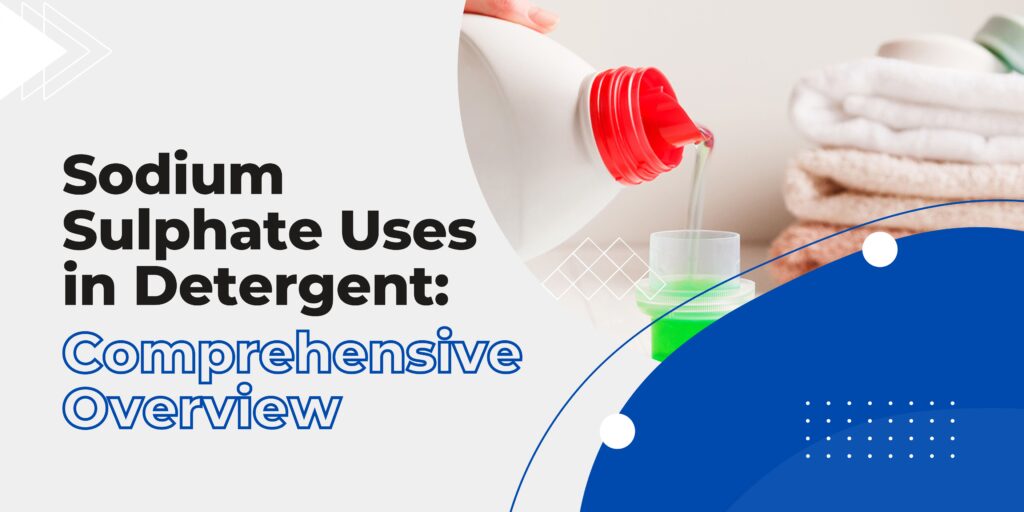
Sodium sulphate, a versatile and readily available compound, plays a significant role in the production of detergents. Its multifaceted properties and applications in the detergent industry make it an indispensable ingredient in various formulations. In this article, we will delve into the chemistry and properties of sodium sulphate, exploring its wide array of uses in the detergent manufacturing process.
Chemical Structure and Composition
Sodium sulphate, chemically represented as Na₂SO₄, is a white, crystalline compound that belongs to the class of inorganic salts. It is composed of two sodium ions (Na⁺) and one sulfate ion (SO₄²⁻), making it a neutral salt. Sodium sulphate is water-soluble and occurs naturally in various minerals and as a product of certain industrial processes.
Sources of Sodium Sulphate
Natural Sources
Sodium sulphate can be found in abundance in nature, often in the form of mineral deposits like thenardite and mirabilite. These deposits are primarily found in regions with arid climates and saline lakes.
Industrial Production
Sodium sulphate is also a byproduct of several industrial processes, such as the production of hydrochloric acid, the purification of sodium chloride, and in the pulp and paper industry.
Sodium Sulphate Grades
Sodium sulphate is available in different grades based on its purity and intended applications. These grades can include anhydrous sodium sulphate (without water), decahydrate sodium sulphate (containing 10 molecules of water), and more. The choice of grade depends on the specific requirements of the application.
Sodium Sulphate in Detergent Production
Sodium sulphate serves several critical functions in the manufacturing of detergents, making it an essential ingredient. These functions include:
Bulk and Filler Agent
Sodium sulphate acts as a bulk and filler agent in detergent formulations. It helps to increase the volume and bulk of the detergent without altering its cleaning properties. This is particularly important for powdered detergents.
Flow Improver
Sodium sulphate enhances the flow characteristics of the detergent powder during manufacturing, ensuring a smooth and consistent process.
Cost Reduction
Utilizing sodium sulphate as a filler helps reduce the overall production cost of the detergent, making it an economically attractive option.
Compatibility with Other Detergent Components
Sodium sulphate is compatible with a wide range of other detergent components, including surfactants, builders, enzymes, and optical brighteners. Its inert nature ensures that it does not interfere with the functionality of these components, enabling the formulation of efficient and effective detergent products.
Types of Detergents Utilizing Sodium Sulphate
Powdered Detergents
Powdered detergents, commonly used for laundry purposes, frequently contain a significant amount of sodium sulphate. The sodium sulphate provides the necessary bulk and flow properties to the powder, facilitating efficient packaging, storage, and transportation.
Dishwashing Detergents
Dishwashing detergents, whether in powder or tablet form, often contain sodium sulphate as a filler to maintain the desired volume and consistency. It aids in achieving the appropriate structure for the detergent tablets and ensures even distribution of cleaning agents.
Specialty Detergents
Specialty detergents, such as those for industrial or specific cleaning applications, also utilize sodium sulphate to enhance their physical properties and reduce manufacturing costs. Sodium sulphate’s versatility allows its incorporation into various specialized detergent formulations.
Environmental and Health Considerations
While sodium sulphate is generally considered safe and environmentally friendly, the production and disposal of sodium sulphate can pose potential environmental challenges. Efforts are made within the industry to mitigate these concerns through responsible production practices and waste management.
In typical consumer use, detergents containing sodium sulphate are considered safe. However, like all chemical substances, precautions should be taken to minimize exposure, especially during the manufacturing and handling processes. Proper protective equipment and handling procedures are essential to ensure worker safety.
Conclusion
Sodium sulphate, a versatile and cost-effective compound, plays a crucial role in the detergent manufacturing industry. Its functions as a bulk agent, flow improver, and cost-effective filler make it an indispensable component of various types of detergents, including powdered detergents, dishwashing detergents, and specialty formulations. Moreover, sodium sulphate’s compatibility with other detergent components highlights its importance in producing effective cleaning products. As advancements continue in the detergent industry, sodium sulphate will likely remain a fundamental ingredient, contributing to the efficiency and affordability of detergent products.




